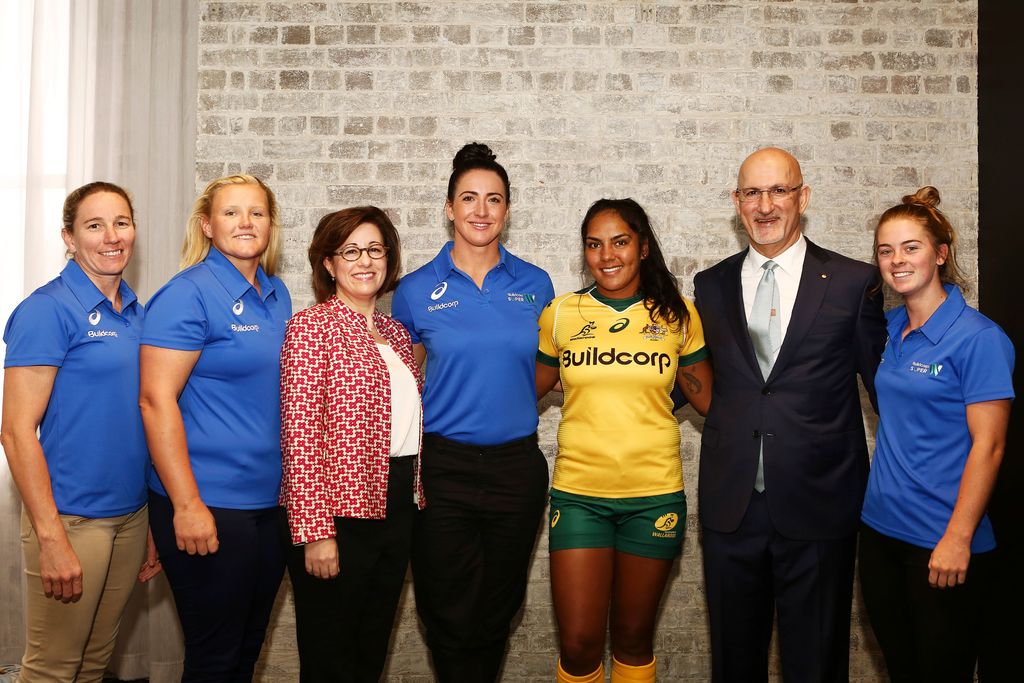Josephine Sukkar hopes she can help foster healthier communities, both physically and mentally, in her new role as chair of the Australian Sports Commission.
Sukkar, who became the first woman appointed to the position last month, was already chairing the Sports Diplomacy Advisory Council for the Department of Foreign Affairs and Trade when she was approached last year.
But, the opportunity to work with Sport Australia and the Australian Institute of Sport, overseeing both elite and recreational participation in the country, proved too good an offer to turn down.
“When I was approached around this one, I thought, no, this is perhaps the role that would be good to be a partner in reimagining how sport might help shape our nation,” Sukkar told World Rugby.
“We have beautiful weather, we are a nation that is outside a lot. Most of our children are playing sport on weekends and as adults, a lot stay on.
“But, of course, as we move further and further into becoming more civilised and more affluent, all of those first world diseases have become issues for us, and sport can fix obesity, type two diabetes, etc.
“And I thought, well, this is a way that I can play my part and try and work with government and all stakeholders to see if we can reshape some of the thinking around the nation.
“And, I'm interested to understand and play the long game on this. In 10 to 20 years [we’ll] hopefully see some of the social and economic benefits that come from a nation that's fit and healthy — mental health, physical health.”
Gradual return to play
Sukkar says the biggest challenge facing her in the role is how to help Australia rebound from the ongoing COVID-19 pandemic, which took hold shortly after wildfires had damaged parts of the nation and its wildlife.

“How do we move forward from a COVID environment where we went from not being able to play sport, and in particular team sport?” she said “Now, how do we gradually, a bit at a time, help our country and people within Australia who want to participate, particularly in team sport, do it safely?
“So there's going to be a bit of a two-step approach here. Times like now, it throws up the chance to rethink and reimagine what opportunities might we have now, having sort of all pulled back and had a look at sport in this country.
“I'm very keen to work with sporting bodies to understand, yes, there are a lot of things that went wrong and a lot of things that we couldn't do, that we all wish didn't happen.
“But like anything, there will be opportunities that I'll see, and I need to spend a bit of time listening to governing bodies and what they want.”
Important victory
Sukkar grew up around sport as her father was a doctor who worked with local rugby league teams, and later volunteered at the Olympic Games in Sydney.
However, it was not until she met her husband, Tony, who played for Sydney University, that she was introduced to rugby union.
Over the past three decades the game has become an important part of her life. The family business, Buildcorp, sponsors the Wallaroos and Sukkar is the president of Australian Women’s Rugby.
Lobbying from Sukkar and Buildcorp also helped the Wallaroos in their successful fight to be allowed to wear the coat of arms of Australia at Rugby World Cup 2017.
“That was an issue for some of the players, because some of them worked for the government. In those government roles, if they were representing their country, but only if they were wearing a coat of arms in that representation, they could access a different type of leave,” Sukkar explained.
“They were the only one of our teams that we were sending away without a coat of arms.
“Assisting to advocate for that to finally happen, so that the women could, number one, be proud and watch that Australian flag go up. And, genuinely be represented with a coat of arms the way they were representing our country, that was an important thing to me.
“It was a small thing. But for the women, it was really important.”
Looking ahead to RWC 2021, the first women’s edition to be held in the southern hemisphere, Sukkar believes it could be a landmark event.
“How do we reimagine what a women's World Cup in any sport does for a country, over and above just the women being able to participate?” she said.
“For me, every year they get better and better. Ireland did a terrific job hosting the women's Rugby World Cup in 2017. I attended that event [and it was] fabulous, and I think everyone stands on everyone's shoulders. We improve it and improve it.
“I remember this was the case with the Olympic Games in L.A. The first Games that were actually commercially, very, very profitable. So, each time we see another one of these and it has more exposure and more coverage, we all learn from it, we all lift and a rising tide will float all boats.”
READ MORE: Eden Park: A ground swamped in Rugby World Cup history >>





